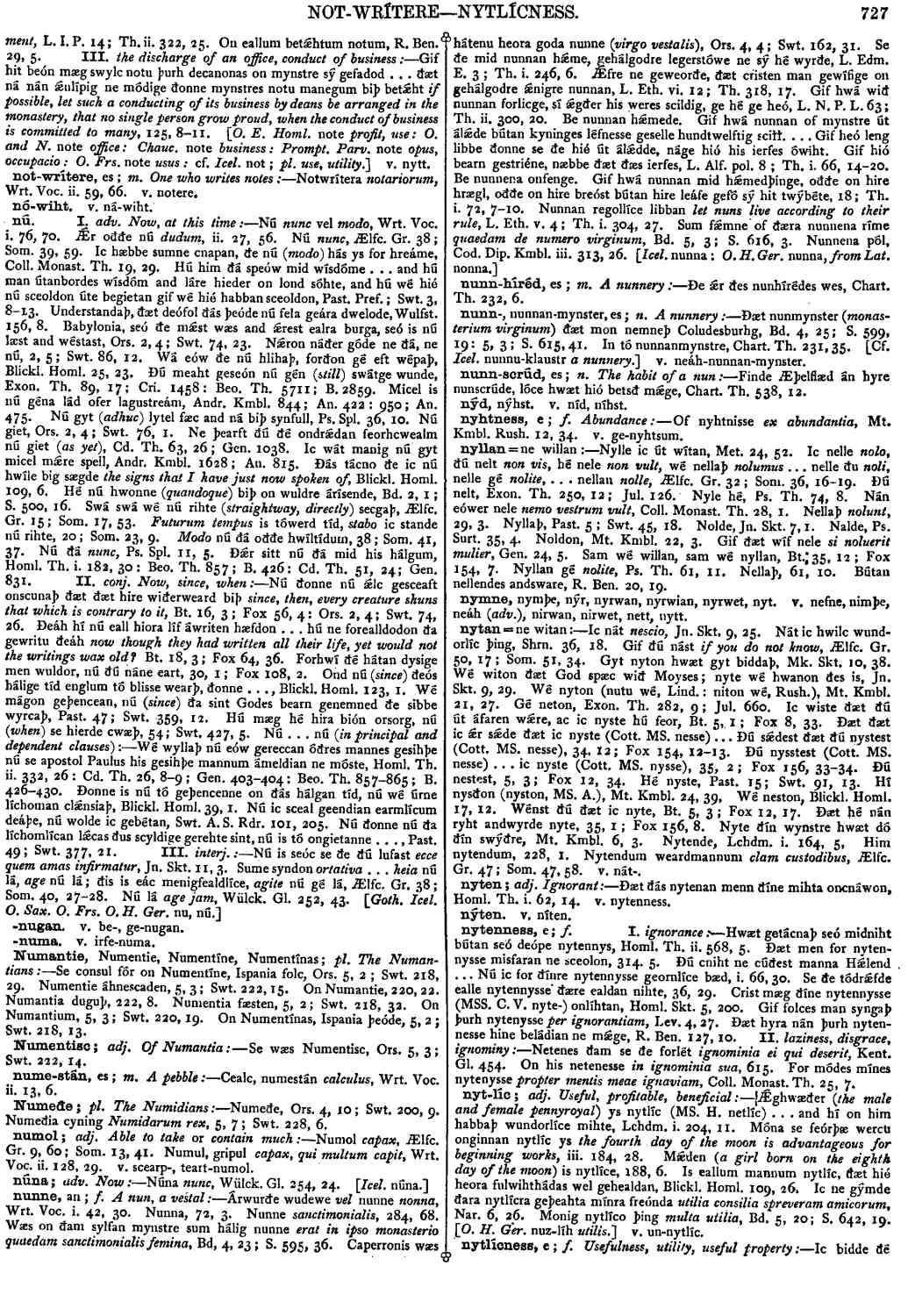nú
- adverb
- conjunction
- interjection
-
Nú
nunc vel modo,
- Wrt. Voc. i. 76, 70.
-
Ǽr oððe nú
dudum,
- ii. 27, 56.
-
Nú
nunc,
- Ælfc. Gr. 38 ;
- Som. 39, 59.
-
Ic hæbbe sumne cnapan, ðe nú (
modo
)hás ys for hreáme,
- Coll. Monast. Th. 19, 29.
-
Hú him ðá speów mid wísdóme ... and hú man útanbordes wísdóm and láre hieder on lond sóhte,and hú wé hié nú sceoldon úte begietan gif wé hié habban sceoldon,
- Past. Pref. ;
- Swt. 3, 8-13.
-
Understandaþ, ðæt deófol ðás þeóde nú fela geára dwelode,
- Wulfst. 156, 8.
-
Babylonia, seó ðe mǽst wæs and ǽrest ealra burga, seó is nú læst and wéstast,
- Ors. 2, 4 ;
- Swt. 74, 23.
-
Nǽron náðer góde ne ðá, ne nú,
- 2, 5 ;
- Swt. 86, 12.
-
Wá eów ðe nú hlihaþ, forðon gé eft wépaþ,
- Blickl. Homl. 25, 23.
-
Ðú meaht geseón nú gén (
still
)swátge wunde,
- Exon. Th. 89, 17 ;
- Cri. 1458 : Beo. Th. 5711 ;
- B. 2859.
-
Micel is nú géna lád ofer lagustreám,
- Andr. Kmbl. 844 ;
- An. 422 : 950 ;
- An. 475.
-
Nú gyt (
adhuc
)lytel fæc and ná biþ synfull,
- Ps. Spl. 36, 10.
-
Nú giet,
- Ors. 2, 4 ;
- Swt. 76, 1.
-
Ne þearft ðú ðé ondrǽdan feorhcwealm nú giet (
as yet
),- Cd. Th. 63, 26 ;
- Gen. 1038.
-
Ic wát manig nú gyt micel mǽre spell,
- Andr. Kntbl. 1628 ;
- An. 815.
-
Ðás tácno ðe ic nú hwíle big sægde
the signs that I have just now spoken of,
- Blickl. Homl. l09, 6.
-
Hé nú hwonne (
quandoque
)biþ on wuldre árísende,
- Bd. 2, 1 ;
- S. 500, 16.
-
Swá swá wé nú rihte
(straightway, directly)
secgaþ,
- Ælfc. Gr. 15 ;
- Som. 17, 53.
-
Futurum tempus
is tówerd tíd,
-
stabo
ic stande nú rihte,
- 20 ;
- Som. 23, 9.
-
Modo
nú ðá oððe hwíltídum,
- 38 ;
- Som. 41, 37.
-
Nú ðá
nunc,
- Ps. Spl. 11, 5.
-
Ðǽr sitt nú ðá mid his hálgum,
- Homl. Th. i. 182, 30 : Beo. Th. 857 ;
- B. 426 : Cd. Th. 51, 24 ;
- Gen. 831.
-
Nú ðonne nú ǽlc gesceaft onscunaþ ðæt ðæt hire wiðerweard biþ
since, then, every creature shuns that which is contrary to it,
- Bt. 16, 3 ;
- Fox 56, 4 : Ors. 2, 4 ;
- Swt. 74, 26.
-
Ðeáh hí nú eall hiora líf áwriten hæfdon ... hú ne forealldodon ða gewritu ðeáh
now though they had written all their life, yet would not the writings wax old?
- Bt. 18, 3 ;
- Fox 64, 36.
-
Forhwí ðé hátan dysige men wuldor, nú ðú náne eart,
- 30, 1 ;
- Fox 108, 2.
-
Ond nú (
since
)ðeós hálige tíd englum tó blisse wearþ, ðonne ...,
- Blickl. Homl. 123, 1.
-
Wé mágon geþencean, nú (
since
)ða sint Godes bearn genemned ðe sibbe wyrcaþ,
- Past. 47 ;
- Swt. 359, 12.
-
Hú mæg hé hira bión orsorg, nú (
when
)se hierde cwæþ,
- 54 ;
- Swt. 427, 5.
-
Nú . . . nú ( in principal and dependent clauses ) : -- Wé wyllaþ nú eów gereccan óðres mannes gesihþe nú se apostol Paulus his gesihþe mannum ámeldian ne móste,
- Homl. Th. ii. 332, 26 : Cd. Th. 26, 8-9 ;
- Gen. 403-404 : Beo. Th. 857-865 ;
- B. 426-430.
-
Ðonne is nú tó geþencenne on ðás hálgan tíd, nú wé úrne líchoman clǽnsiaþ,
- Blickl. Homl. 39, 1.
-
Nú ic sceal geendian earmlícum deáþe, nú wolde ic gebétan,
- Swt. A. S. Rdr. 101, 205.
-
Nú ðonne nú ða líchomlícan lǽcas ðus scyldige gerehte sint, nú is tó ongietanne ... ,
- Past. 49 ;
- Swt. 377, 21.
-
Nú is seóc se ðe ðú lufast
ecce quem amas infirmatur,
- Jn. Skt. 11, 3.
-
Sume syndon ortativa . . . heia nú lá, age nú lá; ðis is eác menigfealdlíce, agite nú gé lá,
- Ælfc. Gr. 38 ;
- Som. 40, 27-28.
-
Nú lá
age jam,
- Wülck. Gl. 252, 43.
Bosworth, Joseph. “nú.” In An Anglo-Saxon Dictionary Online, edited by Thomas Northcote Toller, Christ Sean, and Ondřej Tichy. Prague: Faculty of Arts, Charles University, 2014. https://bosworthtoller.com/23938.
Checked: 1